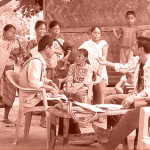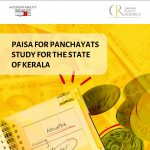
Experiences from the Bhilwara NREGA Social Audit
26 October 2009
Abhijit Patnaik
The NREGA guarantees certain rights to all workers – 100 days work to each family in a year, full pay for full work, unemployment insurance if work is not given in the first fifteen days after applying, work within 5km of the village, the right to inspect employment registers and muster rolls at the panchayat office being some of them.
The recently concluded Bhilwara NREGA Social Audit Padyatra involved over 1600 Block and district resource personnel from all over Rajasthan, NGO workers and other volunteers from different parts of India including Orissa and Mizoram. The Social Audit has become an important means through which people can get involved in the planning, execution and monitoring of various aspects of the law. The experience of implementation of the law over the last three and a half years has shown that people’s involvement is crucial to the better implementation of the law and people’s ability to access their entitlements.
The 4 day training period involved explaining what the teams were supposed to do during the audit, a day of ‘’shramdhaan’’ involving physically working on NREGS worksites (in our case- digging holes ) to experience firsthand the effort involved in earning Rs.100 a day, distribution of teams (125 in all), speeches by representatives of the Mazdoor Kisan Shakti Sangatahan (including Aruna Roy and Nikhil Dey) and the Government of Rajasthan on the importance of the NREGA for the rural poor and the Audit and how we were supposed to go about conducting it .The entire exercise was made possible by the cooperation, at various levels, of the government and especially the District Collector Manju Rajpal (the NREGA Social Audit in Dungarpur district of Rajasthan was also conducted when she was the DC there). However, there was news floating around of how prior to the audit various sarpanches and officials had gotten together to oppose it, and had purposely stopped all worksites during the audit to make inspections more difficult to conduct.
Our team consisted mainly of Block Resource Personnel from the Udaipur area. The teams were flagged off by the Panchayati Raj Minister Mr. Bharat Singh. 11 Special teams were also sent to the various blocks to conduct in-depth audits where muster rolls, job cards, works undertaken etc were scrutinized with a fine-tooth comb. Since the rest of the teams were spending 1.5 days per panchayat, in-depth technical audits of the work carried out under the NREGS was not always possible. However -armed with mobile microphone’s, flags, banners and more importantly, the Management Information System files for the villages (which includes financial and work-related information on all Job cards, construction works etc conducted in the villages) – we set out into our 3 panchayats. Staying in the village school, walking around taking complaints on job card or payment irregularities, requesting villagers to have one or two team members over for meals, inspecting and writing reports on the quality and efficacy of the work sites, checking whether standard practices were being followed by the ‘mate’ ( worksite in-charge), meeting the village secretary and doing a full check of all records -bills, job card information , employment registers etc- relating to the NREGS were all carried out by each team.
Findings:
In general, worksites do not have boards with information on the amount of money spent on them (a requirement), workers are not divided into groups when working, are given more than the prescribed amount of work to earn Rs.100 a day ( and even then are not being paid the full rate) . In every village we went, workers were being paid the average rate, usually between 60-80%. Most mates were not properly trained on how to take measurements at worksites to judge each worker’s due.
Many job cards are not filled in properly. The payment column in job cards is usually missing. A majority of them are kept with the mate, a clear violation. Muster rolls have a lot of mistakes and things are crossed out, which is again against the rules. Information on payments made to job card holders and also on works in the village which are supposed to be displayed on the walls of the panchayat office are generally missing.
Form 6, which is to be used by those seeking employment, is basically never filled. Workers simply go and talk to the mate for work and he asks people to come by in an ad hoc fashion. This means that if they do not find work in 15 days, they are not eligible for unemployment insurance. In two villages people told us how some family members of the sarpanch were picking up payments for work but never show up. In fact, in Hurda block, the audit teams found 15% of job cards were forged. Of course, many people who are eligible for job cards don’t have them, and a large number of people had not received payments in over 3-4 months. In one extreme case in village Haled, someone who had applied for work and not received it for over 1.5 yrs received over Rs.4000 in unemployment insurance when this was discovered by the audit team. The worksites we inspected (mostly watershed management related) had been beneficial for animals in the area.
Knowledge of the public about their rights and entitlements under the NREGS is very poor. The teams walked around the villages spreading information and leaflets, talking to villagers about the same, but more needs to be done in this respect.
Reports from many villages came in that teams had to deal with sometimes unfriendly sarpanches and other village administration. In the village Bada Mahua we visited, the Sarpanch’s brother and loyalists constantly shadowed us as we made rounds through the village meeting people. As a result they were not willing to talk openly about issues they had. In fact, in the Aamli panchayat, around 50 sarpanch loyalists even slept in the school where the audit team was and interfered in their work. In Peepli village, the entire village administration work had been contracted out to one Madan Lal , a farmer, by the village secretary. Reecchda was one of the other villages assigned to us. Along with the illegal use of JCB (earth-digging) machines, we also uncovered financial fraud there. Apparently the ‘firm’ from which 6000 units of cement has been procured for a worksite was nothing more than the local cycle- repair shop!!
Several cases of untouchability practices were unearthed. Members of a certain caste were not allowed to sit under the shade provided at worksites or drink from the same vessel. Another major issue was that most procurement was done through ‘kuccha’ bills, with no CST, TIN or other tax /registration number for identification. Payments were made in cash which makes tracking problematic.
The audit was somewhat successful in its attempts at highlighting the problems within the implementation of the program -many FIRs were filed against officials, a lot of blocked payments were made, job cards issued and awareness created. Some of the useful recommendations that came out of this were the use of technology to overcome problems in payment using biometric methods (as done in parts of Andhra Pradesh), conducting social audits twice a year in all villages, adding photographs to passbooks to prevent any fraudulent handling of them, and most importantly the setting up of a social audit directorate within the Rajasthan government.
For more, see a recent article in the Hindu.
Abhijit Patnaik is Senior Researcher, Accountability Initiative





